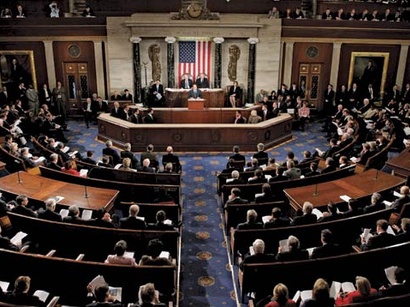US senator backs campaign on Azerbaijani genocide

By Sara Rajabova
A United States senator has voiced support for the campaign over the 95th anniversary of the genocide of Azerbaijanis committed by Armenians.
Senator Dianne Feinstein addressed a letter to the organizer of the campaign.
"I believe it is important to properly investigate, document and recognize incidents of genocide in order to help ensure that such acts never occur again. Further, I believe the U.S. must work with the United Nations and our friends and allies in the international community to advance human rights and prevent genocide and mass atrocities from occurring in the future," Feinstein said.
She added that on December 22, 2010 the Senate unanimously approved Concurrent Resolution 71 supporting and encouraging efforts to develop a comprehensive approach to prevent and mitigate mass atrocities.
"I was proud to cosponsor this resolution," Feinstein said.
Representatives of Azerbaijani and Turkish diasporas in the U.S. earlier sent an appeal to the Congress in connection with the Day of Genocide of Azerbaijanis, requesting to inform the worldwide community in this regard.
Also, recently the US New Jersey state's Assembly issued a commemorative resolution that recognizes March 31 as Azerbaijani Remembrance Day marking the 95th anniversary of the Azerbaijani Genocide. The resolution highlighted that the genocide of March 1918, in which more than 20,000 innocent Azerbaijani people lost their lives, represents one of the most condemnable atrocities in world history.
The New York State Senate after the adoption of Resolution 3784 in March 2012 became the first state ever to recognize the Genocide of Azerbaijanis in law. The resolution also recognized March 31 as Azerbaijani Remembrance Day.
Besides, the US state of Nevada has twice issued a proclamation - in 2009 and 2011- on observing March 31 as a Day of Remembrance, honoring the victims resulting from the fighting that began in March 1918.
During those developments, Armenian Bolshevik troops led by Stepan Shaumyan massacred thousands of people, burnt Islamic shrines and confiscated the 400-million-manat estate of Baku residents. Tezepir Mosque was bombed, and one of the magnificent architectural buildings, Ismailiyyeh, was burnt down.
The genocide policy pursued against Azerbaijanis was not limited to Baku. Armenian dashnaks killed 8,027 Azerbaijanis, including 2,560 women and 1,277 children, in 53 villages of Shamakhy, 110 km west of Baku, on March 31. Also, 16,000 Azerbaijanis were murdered in 162 villages of Guba, northern Azerbaijan. The Armenian dashnaks burnt thousands of villages in Lenkeran, Mughan and Nagorno-Karabakh as well and killed thousands of people there.
Special Investigation Commission set up by the Azerbaijan Democratic Republic on July 15, 1918 collected a great number of documents and submitted them to the government. In 1919, the Azerbaijani parliament made a decision on marking March 31 as the day of Azerbaijanis' genocide.
Though this date was essentially forgotten during the Soviet times, relevant investigations on the tragedy were carried out and books were published after Azerbaijan gained independence from the USSR in 1991.
President Heydar Aliyev issued a decree on March 26, 1998 to commemorate March 31 as the Day of Azerbaijanis' Genocide. Since then, every year Azerbaijanis living in countries around the world mark March 31 as the Day of Genocide.
Here we are to serve you with news right now. It does not cost much, but worth your attention.
Choose to support open, independent, quality journalism and subscribe on a monthly basis.
By subscribing to our online newspaper, you can have full digital access to all news, analysis, and much more.
You can also follow AzerNEWS on Twitter @AzerNewsAz or Facebook @AzerNewsNewspaper
Thank you!
